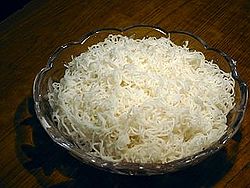Sevai

Freshly extruded Sevai
|
|
| Alternative names | Shyavige |
|---|---|
| Type | Rice noodle/rice vermicelli |
| Place of origin | India |
| Region or state | Tamil Nadu and Karnataka |
| Main ingredients | Rice |
| Variations | Santhakai |
| |
|
Sevai or shyavige or santhakai is a type of rice vermicelli popular in Southern India, particularly Tamil Nadu (Kongunadu region) and Karnataka. Santhakai is made out of other food grains like wheat, ragi, etc. also are increasingly becoming popular.
Sevai is distinctly different from its cousin idiappam in the sense of input material, making process, and post-extrusion recipes. Sevai is popular as a breakfast or dinner food and is easily digestible as it can be made with less or no oil, and it is steamed.
Sevai is mostly made fresh starting from rice grains. It is also prepared from a dried sevai packs (or rice sticks) like the instant ones in the Asian grocery stores. Traditionally, making of sevai at home consists of the following steps (with minor variations based on location and family customs):
Homemade sevai is often made from 100% rice (in addition to water and salt) whereas dry rice sticks may often have some additives like tapioca, corn starch, etc. Instant rice noodles have other additives like Wheat gluten, Guar gum, edible starch, etc. In Southern parts of Karnataka, shyaavige is made of different grains with different consistencies. When made with ragi or millet the vermicelli is fatter, whereas when made with rice or wheat the strands are thinner.
...
Wikipedia
